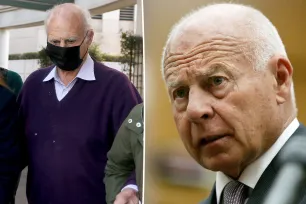Days before the release of Rajkumar Hirani’s Dunki, The Indian Express visited Gholpura village in Haryana-Punjab border, where every house has a member settled abroad. And most of them have taken the Dunki (or the illegal) route to Canada, US and England. One thing that most interviewees mentioned is how this perilous journey, which passes through some of the most hostile terrains in the world, wouldn’t have been possible without the kindness of fellow travellers. Men and women from different walks of life, who would share their bread with fellow Indians, ensure that no one gets left behind.
In Hirani’s ‘Dunki’, goodness of the common Indian propels the story forward. In a way, it’s a Hirani construct — the unflinching faith (rather hope) in humanity that once defined films of Hrishikesh Mukherjee. Hirani, in the way only he can, throws light on the lives of a few Dunki travellers who migrate to London from Punjab. What follows is a rags-to-not-rags story, as Manu (Taapsee Pannu), a feisty girl from a Punjab village, travels illegally to England, walking through perilous jungles, dodging bullets of border police, escaping rape and persecution, with a little help from the adoring Hardy (Shah Rukh Khan), her ‘banda’ (boyfriend). Embedded within it, however, is a story of red tape (and corruption) that surrounds every effort of these helpless men and women who want to access a better life in countries that will anyway use them for work that none of their citizens want to do. Manu and her friends find their way through the dehumanising labyrinth of forms, oral tests, fake marriages and cons, until a combination of persistence and Shah Rukh Khan, take them back to where it all started, the Punjab village, where the mustard field is always swaying to Pritam’s melodies and lassi flows endlessly from jugs. The very structure of ‘Dunki’, and indeed almost all of Hirani’s films, means it will always have the propensity to drift into melodrama, and plays with the kind of cliches that will pull at your heartstrings. But it almost always comes back to a more pointed center because of another quintessential Hirani ingredient — humour.

Hirani never loses his sense of humour, at times at the risk of diluting the messaging too. He has the prolific filmmaker, Hrishikesh Mukherjee, to thank for that probably. In many interviews, Hirani cited Mukherjee, the pioneer of Bollywood’s middle-of-the-road cinema, as his inspiration. Mukherjee brought into focus the middle-class India, which was hitherto neglected in an industry obsessed with stories of either the rich, or picaresque tales of charming ruffians. In films like Gol Maal (1979) and Chupke Chupke (1975), Mukherjee talked about the quirks and the failings of middle-class India with compassion. In Dunki too, much of the focus is on the middle-class. The humour is rooted in the many failings of the lives we lead. One running joke in the film, that veers dangerously close to being sexist, focuses on the trousers that a woman has to wear as a security guard. Her husband has recently died and she has taken this job to support her family. Her pants are a talking point in the conservative Punjab village. Her son decides to take the Dunki to ensure that her mother doesn’t have to wear trousers again, only to realise she now enjoys wearing them. Hirani redeems himself and you have a good, guiltless laugh.
ALSO READ | Dunki is Rajkumar Hirani’s darkest film, but it’s also his driest and dated
Shah Rukh Khan’s Hardy is your quintessential Hirani (and Hrishikesh Mukherjee) protagonist, a man shaped by his ideals. Not very different from Dharmendra’s Satyapriya in Mukherjee’s 1969 classic, Satyakam. His patriotism is pragmatic, centred and devoid of jingoism. When asked to lie about being in danger in his own country in order to seek asylum in England in the court, Hardy refuses. It’s a choice that comes naturally to him, it’s true to the logic of the film. Hardy’s life won’t change much if he doesn’t get this opportunity; Hirani doesn’t make a hero moment out of that. Manu (Taapsee), however, chooses to lie and stay back and make a life there. She has too much at stake and she makes that decision knowing that her life in England will not be a bed of roses. She is an equal hero for making that decision.
Hirani, by choosing to not judge his characters, makes ‘Dunki’ a potent testimony to the suffering of many.
Disclaimer: The copyright of this article belongs to the original author. Reposting this article is solely for the purpose of information dissemination and does not constitute any investment advice. If there is any infringement, please contact us immediately. We will make corrections or deletions as necessary. Thank you.







